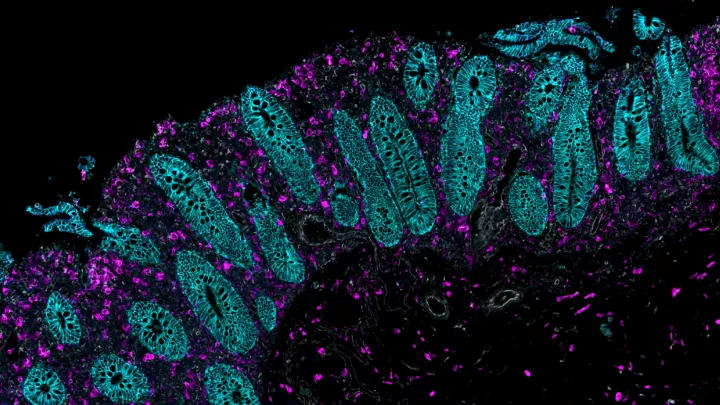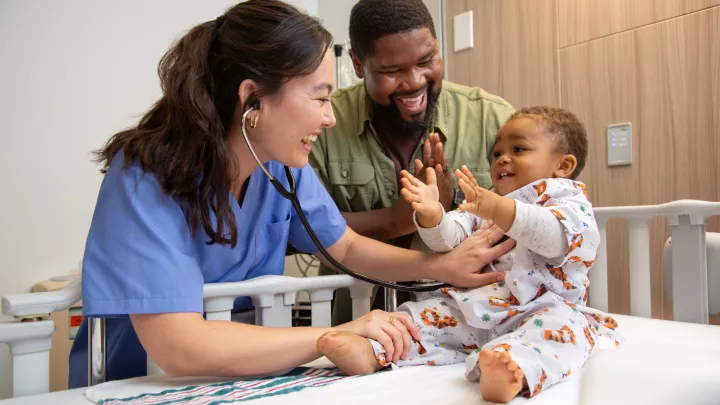Motility Disorders Program
The Neurogastroenterology and Motility team at Children’s Hospital Los Angeles is dedicated to providing high quality and comprehensive care to children with gastrointestinal sensory and motility disorders. In a healthy child the nerves and muscles of the digestive tract work together to move food through the body from the mouth to the anus. At any point along the digestive tract problems with tissues, nerves, or muscles can result in difficulty swallowing, abdominal pain, constipation, bloating, nausea and vomiting, and impaired growth. At Children’s Hospital Los Angeles we utilize cutting edge techniques in the diagnosis and management of various conditions. Our team of specialists is trained to understand and treat motility disorders that can be difficult to diagnose or manage.
Comprehensive Care
At Children’s Hospital Los Angeles we know that children suffering from gastrointestinal motility problems have a variety of chronic symptoms that can cause significant physical and emotional stress for both children and their parents. Our multidisciplinary team of doctors, nurses, physical therapists, social workers, and dieticians is committed to providing individualized, customized diagnostic and treatment plans. We work closely with our patients and their families, along with their primary gastrointestinal physician, to address all aspects of the child’s well-being. Our personalized treatment plans may include medications, nutrition, behavior modifications, surgery, or endoscopic therapy. Our specialized and dedicated nursing team is enurse easy communication with families and coordination of multi-specialty care plans.
Advanced GI motility testing: Gastrointestinal motility disorders can be difficult to diagnose and require advanced techniques for testing. These procedures help our team better understand your child’s symptoms and guide a treatment plan. The Neurogastroenterology and Motility Program at Children’s Hospital Los Angeles is one of only a handful of programs in the country that offer specialized pediatric GI motility testing.
Anorectal Manometry: Anorectal Manometry is used to evaluate patients with constipation or fecal incontinence. This test measures the pressures of the anal sphincter muscles, the sensation in the rectum, and the nerve reflexes that are needed for normal bowel movements. A thin and flexible pressure-sensing tube is placed into the anus and connected to a computer that takes the recordings. Anorectal manometry testing usually occurs as an outpatient and no sedation required. The testing appointment will last approximately 1 hour. An enema or rectal suppository is typically required prior to testing because an empty rectum is needed for this testing.
Esophageal Manometry: Esophageal Manometry is used to evaluate patients with swallowing problems. This test measures the strength and function of the muscles in your esophagus (the “food pipe”) that work to push food and liquids from the mouth down to the stomach. A thin and flexible pressure-sensing tube is placed down the nose and throat into the esophagus and connected to a computer that takes measurements during swallowing. This test usually occurs as an outpatient and no sedation is required. Topical lidocaine is inserted into the nostrils prior to the study to make insertion of the catheter from the nose into the stomach less uncomfortable. The study lasts about 60-90 minutes. The patient is not allowed to eat 2 hours prior to the study.
Antroduodenal Manometry: Antroduodenal or small bowel manometry is used to evaluate patients with nausea or vomiting. The test measures the strength and coordination of the muscle contractions of the stomach and small intestine during three phases: fasting, after a meal, and medication administration. This testing is typically done in the hospital. A thin, flexible pressure-sensing catheter is placed while under anesthesia. This may placed through the nose, past the stomach into the small intestine by the Interventional Radiology Department, or through an existing g-tube by a gastroenterologist. Once the patient recovers from anesthesia the catheter will be connected to a computer that measures muscle contractions for about 6-8 hours. The child goes home after the study.
Colonic Manometry: Colonic Manometry is used to evaluate patients with severe constipation. The test measures the strength and coordination of contractions of the colon (or large intestine) during three phases: fasting, after a meal, and medication administration. This testing is done in the hospital. The child is typically admitted 1-2 days prior to the procedure in order to complete a bowel clean out, as an empty colon is needed for the study. The pressure-sensing catheter is placed during a colonoscopy in the operating room while the child is under anesthesia. Once the patient recovers from anesthesia the catheter is connecter to a computer that measures muscle contractions for approximately 6-8 hours. The child goes home after the study.
Depending on the needs of the child, several studies may be performed while the child is in the hospital.
Services We Offer:
- Gastrointestinal Motility Testing
- Pelvic Floor Physical Therapy
Clinical Trials and Research
- Anorectal Manometry Versus Rectal Biopsy in Diagnosing Hirchprung’s Disease
- The effect of abdominal massage on colonic motility patterns
What To Expect During Your First Visit
During the visit you will meet different members of our motility team including physicians, nurses, and physicians in training. Your doctor will review information about the child’s problem, past testing and treatments, and the parent’s concerns and do a complete physical examination. Together a plan will be made and recommendations treatment and necessary testing will be discussed. To ensure a thorough evaluation please provide results of any prior testing before or at the time of your clinic appointment. Unless specifically discussed prior to your visit motility testing is not usually done at the time of the first visit.
Commonly Treated Disorders
Our team cares for motility disorders associated with:
- Achalasia
- Chronic severe constipation
- Encopresis
- Feeding difficulties
- Gastroparesis
- Hirchsprung’s disease
- Irritable Bowel Syndrome
- Megacolon
- Non-retentive fecal incontinence
- Pseudo-obstruction
- Rumination disorder
- Swallowing problems
- Unspecified functional motility disorders
- Anorectal malformations
- Spinal cord injuries or abnormalities with secondary stooling problems
- Pelvic Floor Dysfunction


